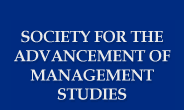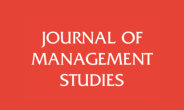Commemorating the 60th anniversary of March and Simon’s “Organizations”
Submission Deadline: 1st June 2017
GUEST EDITORS
- Philip Bromiley (University of California, Irvine, USA)
- Rouslan Koumakhov (NEOMA Business School, France)
- Andrea Prencipe (LUISS University, Italy)
- Denise Rousseau (Carnegie Mellon University, USA)
- William Starbuck (University of Oregon/New York University, USA)
TOPIC OF INTEREST
James March and Herbert Simon’s (1958) Organizations is one of the most influential contributions to the social sciences. To celebrate its sixtieth anniversary, this Special Issue addresses, evaluates and explicates the continuing relevance of this work in various fields of management and organization studies. In line with the Carnegie School’s tradition of interdisciplinary research, we welcome contributions from across the social sciences and humanities. Contributions might address, but are not limited to issues such as the following:
- March and Simon’s integration of individual and organizational decision-making subsequently became distinct areas of study (March and Shapira, 1982). How might these intellectual domains be reconnected?
- What new opportunities does March and Simon’s analysis of managerial cognition offer to the understanding of organizational attention (Occasio, 1997), mental representations (Gavetti, 2005), modularity (Brusoni and Prencipe, 2001), uses of heuristics (Artinger et al., 2015; Kahneman and Tversky, 2000; Lovallo and Kahneman, 2000), organizational memory and learning, firms as cognitive communities (Porac et al., 2011) and neurocognitive foundations of managerial decision-making (Laureiro-Martínez et al., 2015)?
- How might this book advance understanding interpretation, sensemaking and categorization (Starbuck, 2015)?
- What are the methodological implications of March and Simon’s book for empirically validating current approaches to management and organizations, including evidence-based management (Rousseau, 2006)?
- What implications does March and Simon’s book have for advancing strategic management theory, research and practice?
- How do we reconcile the theories of March and Simon with the existence of (some) evidence of proactive strategic change and how can these theories bring together backward-looking and forward-looking models (Gavetti and Levinthal, 2004)?
- How might measurement issues raised by this book be addressed, for example, operationalizing key concepts such as aspirations, search, etc. (Washburn and Bromiley, 2012)?
- Consider the book’s implications for understanding rules and programs. How might its concept of programs enrich research on routinized behavior in organizations and/or help renew the concepts of rules, routines and capabilities (Cohen, 2012; Hodgson and Knudsen, 2004; Miller et al., 2012; Winter, 2013), especially in the face of increased concern with organizational change, flexibility and various re-conceptualizations of organizational routine, with their focus on agency and mindfulness (Feldman and Pentland, 2003)?
- How can we relate March and Simon’s understanding of coordination and related issues, such as conflict, organizational and professional identifications, group norms, adaptation and flexibility, goals and sub-goals, formal and informal communication structures, and work division, to today’s understanding of these issues?
- Because March and Simon’s conceptualization of organization members cannot be reduced to rational choice theory or a variation of social determinism, to what extent may their approach be viewed as overcoming the macro-micro division in management and organization studies?
- How can social theories and philosophies (e.g., critical realism, neo-pragmatic theories of justification, conventionalist approaches, cultural-theoretical approaches to risk, institutional dynamics), and their applications to management studies (Reed, 2005; Patriotta et al., 2011; Muzio et al., 2013), support and develop the book’s conceptualization of the boundedly rational and socially receptive individual?
- Were March and Simon too strongly influenced by mid-20th century ideas about organizations, especially large industrial firms? Have 21st century trends in organizing made (aspects of) March-Simon obsolete? (E.g., force-field organizations, corporations with global reach and no nationalities.)
We encourage theoretical or empirical articles that approach the subject creatively. Empirical contributions can be quantitative or qualitative.
SUBMISSION PROCESS AND DEADLINES
- Papers will be reviewed according to the JMS double-blind review process.
- Submissions should be prepared using the JMS Manuscript Preparation Guidelines (http://www.socadms.org.uk/wp-content/uploads/JMS-Manuscript-Preparation-Guidelines.pdf).
- The deadline for submissions is 1st June 2017.
- Manuscripts should be submitted by e-mail to the guest editors at the following address: koumakhov@neoma-bs.fr and copied to bromiley@uci.edu; denise@cmu.edu; starbuck@uoregon.edu.
- Informal enquiries relating to the Special Issue, proposed topics and potential fit with the Special Issue objectives are welcomed. Please direct any questions to the guest editors at the e-mail addresses above.
REFERENCES
Artinger, F., Petersen, M., Gigerenzer, G. and Weibler, J. (2015). ‘Heuristics as adaptive decision strategies in management’. Journal of Organizational Behavior, 36 (S1), S33-S52.
Brusoni, S. and Prencipe, A. (2001). ‘Unpacking the black box of modularity: Technologies, products and organizations’. Industrial and Corporate Change, 10, 179-205.
Cohen, M. (2012). ‘Perceiving and remembering routine action: Fundamental micro-level origins’. Journal of Management Studies, 49, 1383-87.
Feldman, M. S. and Pentland, B. T. (2003). ‘Reconceptualizing organizational routines as a source of flexibility and change’. Administrative Science Quarterly, 48, 94–118.
Gavetti, G. (2005). ‘Cognition and hierarchy: Rethinking the microfoundations of capabilities’ development’. Organization Science, 16, 599-617.
Gavetti, G. and Levinthal, D. A. (2004). ‘The strategy field from the perspective of management science: Divergent strands and possible integration’. Management Science, 50, 1309-18.
Hodgson, G. M. and Knudsen, T. (2004). ‘The complex evolution of a simple traffic convention: the functions and implications of habit’. Journal of Economic Behavior & Organization, 54, 19-47.
Kahneman, D. and Tversky, A. (eds.) (2000). Choices, Values and Frames. Cambridge: Cambridge University Press.
Laureiro-Martínez, D., Brusoni, S., Canessa, N. and Zollo, M. (2015). ‘Understanding the exploration-exploitation dilemma: An fMRI study of attention control and decision-making performance’. Strategic Management Journal, 36, 319-38.
Lovallo, D. and Kahneman, D. (2000). ‘Living with Uncertainty: Attractiveness and Resolution Timing’. Journal of Behavioral Decision Making, 13, 179-90.
Miller, K. D., Pentland, B. T. and Choi, S. (2012). ‘Dynamics of performing and remembering organizational routines’. Journal of Management Studies, 49, 1536-58.
Muzio, D., Brock, D. and Suddaby, R. (2013). ‘Professions and institutional change: Towards an institutionalist sociology of the professions’. Journal of Management Studies, 50, 699-721.
Ocasio, W. (1997). ‘Towards an attention-based view of the firm’. Strategic Management Journal, 18, 187-206.
Patriotta, G., Gond, J.-P. and Schultz, F. (2011). ‘Maintaining legitimacy: Controversies, orders of worth, and public justifications’. Journal of Management Studies, 48, 1804–36.
Porac, J. F., Thomas, H. and Baden-Fuller, C. (2011). ‘Competitive groups as cognitive communities: The case of Scottish knitwear manufacturers revisited’. Journal of Management Studies, 48, 646–64.
Reed, M. (2005). ‘Reflections on the “realist turn” in organization and management studies’. Journal of Management Studies, 42, 1621–44.
Rousseau, D. M. (2006). ‘Is there such a thing as evidence-based management?’. Academy of Management Review, 31, 256-69.
Starbuck, W. H. (2015). ‘Karl E. Weick and the cognitive perspective on organizations’. Management Decision, 53, 1287-99.
Washburn, M. and Bromiley, P. (2012). ‘Comparing aspiration models: The role of selective attention’. Journal of Management Studies, 49, 896–917.
Winter, S. G. (2013). ‘Habit, deliberation, and action: Strengthening the microfoundations of routines and capabilities’. Academy of Management Perspectives, 27, 120-37.
The full call can be found here: JMS – Commemorating March & Simon’s ‘Organizations’ – Special Issue Call

